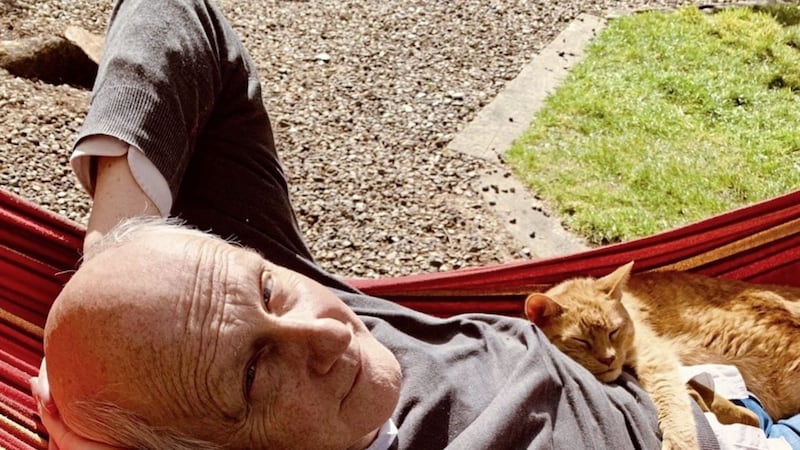This time last year I'd chosen the hammock as my place of refuge. The cat chose the same refuge: which was actually quite reassuring, given my tendency to fall out and require a soft landing. Lockdown was still a bit of a novelty. The sun was shining, baby birds were bouncing around the garden and I was looking forward to a few weeks of catching-up on reading, films and having the children around for most of the day.
Then the worries set in. I was pounced upon by Mr D (my old and always unwelcome companion, depression), who decided to kick me around the place until I was almost helpless. I found myself worrying about everything, particularly the children. I'm an older Dad (they're 22, 11 and 3) and always knew I'd have less time with them than most other Dads; but I wasn't prepared to be greeting the Grim Reaper so soon.
I also found myself fretting about how much time I'd wasted and how little I'd got done. The best-selling novel; the award-winning performance in a Broadway/West End musical; my own radio show; the quirky television documentaries I wanted to make; a walk-on part in Neighbours (it's a long story); and finally making sense of the Eurovision Song Contest scoring system.
To take my mind off all of this I embarked upon a garden project: but too much time was lost on falling off ladders, whacking my head with the rake (even with the spade on one occasion) and not being able to tell the difference between a real plant and a weed. So, a year later the garden looks fairly much the same. As does the house, because plans to paint and decorate were put on hold after Indy's sudden obsession with drawing on walls and preferring to pee wherever it suited him, rather than on the potty or toilet.
I got my first vaccine ten weeks ago and felt upbeat and optimistic afterwards (two descriptions which will surprise regular readers). I'm getting the second one this evening. I've been told it can be a bit rougher than the first (when my only side effect was a desire for tumblers of Baileys), so I'm preparing to hide in bed for the weekend and watch any old nonsense going.
But I've also been reflecting on the past year. The realisation how much friends and family enrich my life. How often I've taken almost everything for granted. What lessons can be learned from how I previously lived my life and how I should try and live it now. Like most people I believed that life would just rumble along on the same tracks (with the occasional detour) and, barring illness or war, there would be few restrictions on how I lived that life. Covid changed my thinking. More important, I hope it has changed it for the better.
Right from the start I knew that panic would be a pointless, self-defeating response. We humans are a hardy, tough, inventive, wanting-to-survive species. Coronavirus would be a problem and an enormous one, but it wasn't going to be the end of the world. Life went on. Life goes on. The horrific scales of death were contained, although every death from Covid had a huge personal impact on the families concerned. It may be a few years before life returns to the previous 'normal' but we will cope. We will carry on.
The other thing that struck me was the increasingly divisive line between social media and reality. For most of the past year Twitter and Facebook have been awash with people complaining about the 'assault' on their liberty, their rights, their freedom of movement and the ever increasing powers governments were taking upon themselves. Many described it as the great reset and saw the hand of sinister globalists in every new turn and regulation. But it doesn't seem to have stopped most of them - including previous cheerleaders of dissent - from getting the vaccine and agreeing to vaccine passports for their own convenience.
An expert on civil dissent noted last summer: most people who use social media to vent their wrath do so in an echo chamber but rarely, very rarely in fact, can be bothered to take a 'real life' stand where it might actually mean something. The likes of Rosa Parks would never have thought a tweet was enough. These people do. Which is very useful for governments, of course, because they're no more problem than the 'sheep' they accuse others of being.
All in all, a victory for science, common sense and sheep of all kinds.








